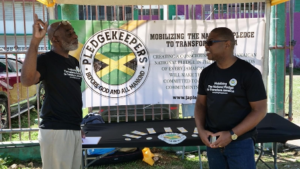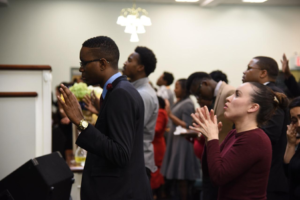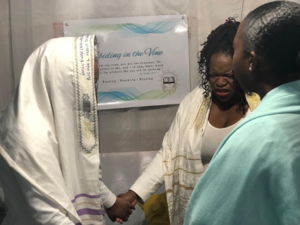Sam George, the member of parliament who sponsored the controversial anti-LGBTQ bill in Ghana, has credited God and the church community for ensuring its passage, despite countless attempts by the United Kingdom and the United States to have it stalled.
The tough-talking George noted that his constituency in Ghana is made up of a large contingent of Jamaicans. He said his constituents backed his efforts to introduce the bill, which is aimed at protecting Ghanaian children from Western ideologies that contradict their understanding of the family.
“We need to add a lot of prayer to this, because this fight, whether you are Christian or not, whether you are a spiritual person or not, believe me, it is not just a physical fight; it is also a very spiritual one,” he told viewers from across the Caribbean who were tuned in to the Marcia Weekes’ show last Sunday evening.
George, who was raised in the church and is currently part of a charismatic fellowship, noted that many corrupt governments, including those in the Caribbean, have taken money to foist the LGBTQ agenda on their citizens. Being an opposition member of parliament, he was challenged by the president of his country, who was against the bill. Members of the ruling party only relented when they realised refusing to offer support could cost them politically.
“I believe that God had ordered our steps with this [bill] because we got a speaker of parliament who was a member of the opposition,” he said, before noting that, “On this particular bill, the speaker made a point that he is Catholic and he supports the bill.”
The MP said he then used “soft diplomacy” to get others to support its passage.

Photo source: DW
“When the bill was at the committee level, the chairman of the committee on constitutional, parliamentary, and legal affairs on the government side frustrated the bill for a whole year on clear instructions not to let the bill go through,” he explained.
George said he reached out to the churches in the chairman’s constituency and informed them that the bill was being blocked. When the chairman later visited the churches to greet his constituents, he realised they had turned against him. He then reached out to George and informed him that he wanted to sign the bill.
“He realised that there was political consequence for him, and that was what we did to all the government MPs, basically. We said to them, the vote on this is not going to be secret; it is open, and we got the media to carry it live, and the speaker would call you and your constituent, the whole country is watching, and ask you how you vote.”
Currently, about 72 percent of the population in Ghana is Christian. The orthodox community, which includes the Methodists, the Presbyterians, the Baptists, and the Catholics, has a huge following. There is also a huge charismatic movement, known as the evangelical movement, in the Caribbean. On the day George presented the bill to parliament, all the leaders of the varying ecumenical bodies accompanied him. He was also accompanied by a representative for the national chief, Iman, who is the leader of the Muslims in Ghana.
“It was a show of strength; it was a show of force,” said George, who noted that both the Catholic Bishops and the Pentecostal churches issued a press release informing the president that he would not have their support in the next election if he didn’t give his approval. General elections will be held in Ghana in December 2024.
George noted that some of the pastors who had branches of their churches in Western countries considered their bottom line and didn’t join the fight.
“There are a few of them who were not able to come out strongly, but we have a few good men who are standing for what is right,” he noted.
George named other countries in Africa that are standing firm. This includes Uganda, where President Yoweri Museveni has signed into law a bill that toughens penalties against the gay lifestyle. The church community in Malawi, he noted, had also sent a US ambassador to their country packing.
George said the fight against the gay rights lobby has been intense, and it has cost him in several ways. He gets a lot of hate mail, his family has been targeted, and he has been listed as a money launderer, among other things.
“This is for our children. We need to pull this off for our children. We need to hold the family, the unit that is fundamental to life; we need to hold it,” he said, while encouraging those in the Caribbean to stand firm.
“It comes back to how you chose to fight. The Americans have decided that their diplomacy is going back to the LGBTQ. They have an LGBTQ ambassador embedded within the Ghanaian embassy, and not just in Ghana, but in several countries, they have a rep in LGBTQ rights in the embassies, whose job it is to push a lot of these ideologies,” he said.
“It comes down to the leadership of the country and how firm they will be,” George said.
There has been an intense push from the international community for Jamaica to repeal the existing buggery law, which criminalises homosexuality. Jamaica is currently one of six countries in the region that still maintain this law. Over 80 percent of the population are Christians.






